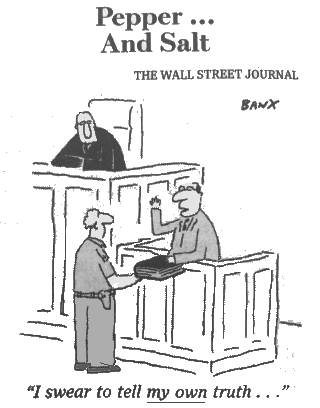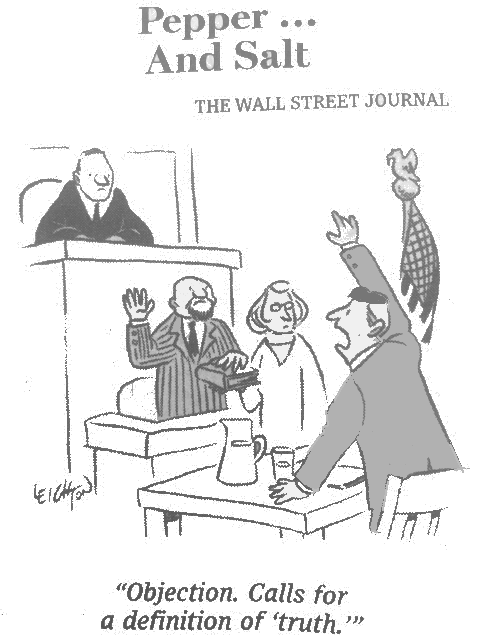True for you but not for me?
Is there such a thing as truth?
Or is everything, including truth, a statement of personal opinion or preference? In other words, is truth relative?
Let’s confine ourselves to the more everyday questions of truth. Like, does it exist? Once, the answer to this question was obvious—usually confined to late-night discussions in college dorm rooms. But no longer. Truth is going through a tough time. A white woman feels black and represents herself to be so. She rises in the leadership ranks of the NAACP until her fiction is exposed. She refuses to go quietly, however. She feels black, and so she is black. A 69 year-old man in the Netherlands petitions the court to legally change his age to 49 because that’s how he feels. And, of course, seemingly on a daily basis, men (and more and more boys), with all the chromosomes and body parts that make them distinctly male, declare themselves to be female; and women (and more and more girls) likewise declare themselves to be male. They feel they are one sex or the other; therefore, they are that sex. And we must accept that, regardless of what the truth is. In a viral video, a 5-foot, 9-inch American Caucasian male asks students at the University of Washington to acknowledge that he’s Chinese, or six-foot-five, or a woman. Some hesitate, but no one will tell him what he’s saying is not true – that he’s not what he says he is. That would be “mean”—and “intolerant.” This “true for you, but not for me” relativism is disconcerting because it requires the acceptance of obvious contradictions, denial of reality, and common sense. Rather than adjusting our lives to the truth, the truth has to adjust itself to us. But it’s very difficult to live this way, not to mention it being highly impractical. We rely on mind-independent universal truths in order to think clearly, to navigate life. Otherwise, we quickly get lost. There must be some things that just are—things that are true. This way points North for everybody, no matter what anyone happens to prefer or sincerely believe. So, what is truth? At its root, truth is a match-up with reality. A story, a statement, or belief is only true if it lines up with what’s real. It’s like a socket wrench fitting perfectly onto a bolt. Reality is the truth-maker; reality makes something true. To say “the earth is flat” or “the moon is made of green cheese” is false. Why? Because it doesn’t match up with reality. Until quite recently, the purpose of all education in large part was the pursuit of truth. The motto of Harvard University, for example, is “veritas,” Latin for “truth.” No more. Anyone who says education should be about the pursuit of truth is immediately shot down with the comeback: “Whose truth?” Increasingly, people speak of “my truth,” or say “it’s true for me,” or “your reality”—as though truth is merely a matter of opinion or perspective. At the 2018 Golden Globe awards, Oprah Winfrey famously said that “speaking your truth is the most powerful tool we all have.” Now, you can have your experience or your perspective. But there is no such thing as “your truth” or “my truth.” There is only the truth—that which is true for everyone. As Wall Street Journal writer Byron Tau noted, “Oprah employed a phrase that I’ve noticed a lot of other celebrities using these days: ‘your truth’ instead of ‘the truth.’” But, he added, “’your truth’ undermines the idea of shared common facts.” And here’s another problem with “your truth”: If “your truth” is truth, anyone who doesn’t hold that truth must be wrong. This sounds a lot like narcissism. And it’s intellectual bullying. “Believe ‘my truth’—or else.” Not exactly a positive, pro-truth message. Yeah, truth is going through a tough time. So let’s review: Truth can’t be relative. If it is relative, it’s not truth. To say “there is no truth for all people” is to declare a truth for all people. In effect, you’re saying, “It’s true that there is no truth!” And to declare that both your and my opinions are true even if they contradict one another is to speak nonsense. Truth isn’t opinion or preference. It’s not subjective or relative. It is inescapable because reality is inescapable. No amount of double-talk will change that. And that’s the truth. Truth Has Become a Right Wing Concept
For our purposes here, let’s put aside the science angle. Yes, you can sit on a couch and not appear to be moving, but since the earth, at the equator, is rotating at 1100 miles per hour, you are, from that perspective, moving—and very fast. I’m not talking about that kind of relative.


5 min
